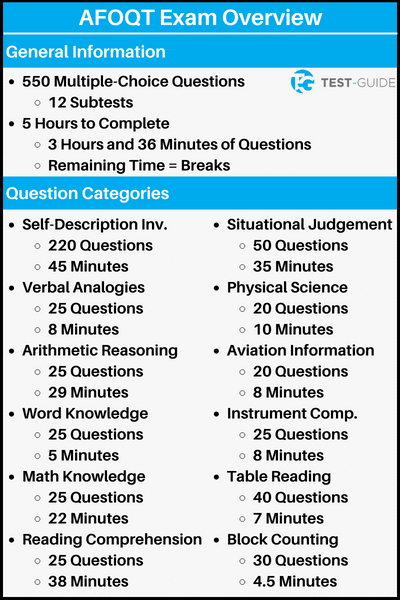Use AFOQT practice tests to prepare for the Air Force Officer Qualifying Test (AFOQT) – a test taken by applicants who want to become an Officer in the United States Air Force.
Our practice exams are 100% free, include detailed answer explanations, and require no registration. Choose the subject you want to practice below!
Start Your Practice
- AFOQT Arithmetic Reasoning Practice Test 1
- AFOQT Arithmetic Reasoning Practice Test 2
- AFOQT Word Knowledge Practice Test 1
- AFOQT Word Knowledge Practice Test 2
- AFOQT Math Knowledge Practice Test 1
- AFOQT Math Knowledge Practice Test 2
- AFOQT Rotated Blocks Practice Test 1
- AFOQT General Science Practice Test 1
- AFOQT General Science Practice Test 2
Other AFOQT Study Resources
If you are looking for some additional help, consider some of the resources in the table below. We have included an AFOQT study guide, AFOQT practice test (PDF format), and flashcards.
| Resource | Provider |
|---|---|
| Study Guide + Practice Test PDF | USF |
| AFOQT Flashcard Set 1 | Quizlet |
| AFOQT Flashcard Set 2 | Quizlet |
| Study Guide (Flashcard Format) | Quizlet |
What is the AFOQT Test?
The Air Force Officer Qualifying Test (AFOQT) is an exam given to candidates who wish to become an Officer in the United States Air Force (USAF).
The exam has the following format:
- 12 Total Subtests
- 550 Multiple-Choice Questions
- 5 Hours to Complete
Just like the SAT and ACT, the AFOQT measures verbal and math aptitude, as well as other potential aptitude relevant to specific career paths within the USAF. The AFOQT can be used to qualify candidates for any USAF Officer programs, including:
- Air Force Reserve Officer Training Corps
- Officer Training School
- Combat Systems Officer Training
- Air Battle Management Training
Scoring well on the Air Force Officer Qualifying Test is vital for any candidate who wishes to become an Officer in the U.S. Air Force.
A passing score on the AFOQT is not only a requirement to qualify for officer training, but your scores will also be used to evaluate your suitability for many other military occupations within the USAF.
This exam is also referred to as the Air Force Officer Test or Air Force Qualifying Test.
Make sure you are ready for the exam by using one one of the AFOQT practice tests listed above.
AFOQT Subtests
The table below outlines the number of questions for each subtest on the Air Force Qualifying Test. You can read a description of each subtest below.
| Subtest | # of Questions | Time Limit (Minutes) |
|---|---|---|
| Self-Description | 220 | 45 |
| Verbal Analogies | 25 | 8 |
| Arithmetic Reasoning | 25 | 29 |
| Word Knowledge | 25 | 5 |
| Math Knowledge | 25 | 22 |
| Reading Comprehension | 25 | 38 |
| Situational Judgement | 50 | 35 |
| Physical Science | 20 | 10 |
| Aviation Information | 20 | 8 |
| Instrument Comprehension | 25 | 8 |
| Table Reading | 40 | 7 |
| Block Counting | 30 | 4.5 |
Self-Description Inventory
The Self-Description Inventory subtest is used to evaluate the candidate’s personality. This portion of the AFOQT is not graded.
Verbal Analogies
The Verbal Analogies subtest of the AFOQT measures a candidate’s abilities with the English language, including understanding of the relationships between words. Your ability to apply logic in order to determine how a set of words are or are not related will be tested.
Word Knowledge
The Word Knowledge subtest of the AFOQT measures a candidate’s understanding of words and their use in written language. Each question will ask the candidate to choose an answer that is most synonymous with the indicated word within the prompt.
Math Knowledge
The Math Knowledge subtest of the AFOQT measures a candidate’s abilities with basic principles of mathematics, including arithmetic, algebra, and geometry. Candidates will be required to solve algebraic word problems, utilizing their knowledge of mathematical principles including:
- Inequalities
- Algebraic Expressions
- Absolute Values
- Systems of Equations
- Exponents
Reading Comprehension
The Reading Comprehension subtest of the AFOQT measures a candidate’s abilities to read various passages and comprehend information within that passage including the meaning and implied meaning.
Situational Judgement
The Situational Judgement subtest of the Air Force Officer Test measures a candidate’s abilities to react to interpersonal issues which will help them serve as a leader.
Physical Science
The Physical Science subtest of the Air Force Qualifying Test measures a candidate’s understanding of concepts from a high school level physical science standpoint.
Aviation Information
The Aviation Information subtest of the AFOQT measures a candidate’s overall understanding of aviation and airplane functions and mechanics. Candidates will need to show an understanding of all of the following concepts:
- Rotary Aircraft
- Fixed Wing Aircraft
- Rudimentary Aviation
- Flight Physics
- U.S. Airport Security Regulations
Instrument Comprehension
The Instrument Comprehension subtest of the AFOQT measures a candidate’s abilities as they relate to determining an aircraft’s position while in flight, using instruments which indicate:
- Compass Heading
- Amount of Climb or Dive
- Degree and Direction of Bank
Table Reading
The Table Reading subtest of the AFOQT measures a candidate’s ability to read and interpret an xy-axis graph, including the ability to find specific coordinates.
Candidates will be given a number of intersecting coordinates in the (x,y) format, and must find as many as they can in the time allotted.
Block Counting
The Block Counting subtest of the AFOQT measures a candidate’s conception of spatial awareness. Candidates will be shown a group of blocks which has been rendered in 3D, and asked to determine how many blocks are touching a given block.
It is important to use the appropriate AFOQT practice tests and study materials for each subtest of the AFOQT.
AFOQT Test Administration
The Air Force Officer Qualifying Test can be administered in a couple different settings. Cadets in the ROTC program will take the AFOQT as a part of their curriculum.
College graduates who did not go through an ROTC program but are interested in joining the Air Force will be required to contact an Air Force Officer recruiter.
Your AFOQT can then be scheduled at the appropriate Military Entrance Processing (MEP’s) location.
AFOQT Fees
There are no fees directly associated with taking the Air Force Officer Qualifying Test. Candidates who do not pass the AFOQT on their first or second attempt may be required to pay for additional training if they wish to take it a third time.
Besides that, the only other costs incurred would be if the candidate chooses to pay for exam preparations. Before doing that, it is recommended that you utilize all available free AFOQT practice tests and other resources.
AFOQT Candidacy Requirements
There are two paths one may take to becoming an Officer in the United States Air Force, and they both require passing the Air Force Officer Qualifying Test.
Air Force Reserve Officer Training Corps (ROTC)
All Air Force ROTC students are required to take the AFOQT when they begin the Professional Officer Course, in their second year of Air Force ROTC.
If a student does not pass the AFOQT on their first attempt, they may try again after 150 days have passed.
Here is some additional information on the ROTC route from the official ROTC website.
Air Force Recruiter
Those wishing to take the AFOQT without prior experience in an Air Force ROTC program may do so by connecting with an Air Force Recruiter.
Candidates may locate a recruiter in their area by registering on the official United States Air Force website, and entering their zip code.
Your recruiter will then determine whether you are a candidate for the AFOQT, and will then register you for the test.
Remember that registering for the test is only the first step. Be sure to practice using the many free resources listed above including several AFOQT practice tests.
AFOQT Scores
There is no one “passing” or “failing” score for the AFOQT. AFOQT minimum scores will vary based on your desired career field, and these scores are based on composite scores, each of which is made up of a specific set of subtest from the AFOQT.
Composite Scores
The five composite scores which are measured for your scores- and their corresponding subtests- are as follows:
- Verbal Composite
- Verbal Analogies
- Word Knowledge
- Reading Comprehension
- Quantitative Composite
- Arithmetic Reasoning
- Math Knowledge
- Pilot Composite
- Math Knowledge
- Instrument Comprehension
- Table Reading
- Aviation Information
- Combat System Officer (CSO) Composite
- Word Knowledge
- Math Knowledge
- Block Counting
- Table Reading
- Air Battle Managers (ABM) Composite
- Verbal Analogies
- Word Knowledge
- Table Reading
- Instrument Comprehension
- Block Counting
- Aviation Information
Minimum scores for each composite will be based on what career path you are interested in following. By understanding what is required for your chosen path, you will know which subtests to focus your studying efforts on.
Here is a table of the required scores for particular career paths:
| Career Path | Required Composite Score | ||||
|---|---|---|---|---|---|
| Verbal | Quant. | Pilot | CSO | ABM | |
| Any Officer | 15 | 10 | * | * | * |
| Pilot (incl. RPA) | 15 | 10 | 25 | 10 | * |
| CSO | 15 | 10 | 10 | 25 | * |
| ABM | 15 | 10 | * | * | 25 |
*indicates no official minimum for that composite in that career path.
Frequently Asked Questions
What is the minimum passing score for the AFOQT?
All aspiring U.S. Air Force officers must attain a minimum score of 15 in the Verbal section and a 10 in the Quantitative section for the AFOQT test. For those who want to become a pilot, CSO, ABM, or some other career path, additional composite scores are required.
How do I prepare for AFOQT?
It is a good idea to have an idea of which career path you would like to take as an Officer in the United States Air Force.
This will help you understand which subtests of the AFOQT are most relevant to your chosen career path, and you can then begin taking AFOQT practice tests according to what your career requires.
Can you fail the AFOQT?
Yes, you can fail the AFOQT. If you do not meet the minimum passing score, you will fail. However, you can re-take the exam but you will have to wait 150 days before you can do so. Please note that you can only take the AFOQT a total of 2 times.
It is important to prepare for this exam beforehand. You can use our Air Force practice test listed above to begin your studies.


